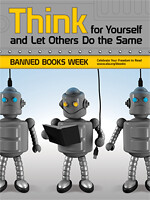Facing the Ultimate Frontier
Neil deGrasse Tyson: edited by Avis Lang
Space Chronicles is a collection of Tyson's most recent writing cleverly assembled by Avis Lang into a coherent book with one central theme. Neil deGrasse Tyson wants to go back to the Moon. He wants to go to Mars. He wants to visit asteroids and he wants to do these things with Astronauts, not just unmanned robotic probes. Why? " . . . the sheer joy of exploration and discovery," for one thing, but also survival: survival of the human species in the event of another, eventually inevitable, extinction level asteroid collision with the Earth, and the survival of the United States of America as a technological, political and economic world leader.
Tyson takes ancient China as an example of decline.
" . . . in the late 1400s, China turned insular. It stopped looking beyond it's shores. It stopped exploring beyond it's then-current state of knowledge. And the entire enterprise of creativity stopped. That's why you don't people saying "here's a modern Chinese answer to that problem." Instead they're talking about ancient Chinese remedies. There's a cost when you stop innovating and stop investing and stop exploring. That cost is severe. And it worries me deeply, because if you don't explore, you recede into irrelevance as other nations figure out the value of exploration."
China, incidentally, is back in the game now. China has a manned space program aimed at putting a Chinese man on the Moon. The solar panels your neighbor put on his roof were probably built in China.Pretty soon a modern Chinese solution to any knotty problem may be the best, cheapest way to go.
Why a manned space program? It's way more expensive to send people into space than machines. The Mars rovers were a spectacular success. The Hubble Space Telescope was an absolute triumph. Tyson's answer is inspiration. The Apollo program inspired many young people, including Tyson himself, to pursue science as a career. This meant studying the hard math and science curricula in school. It meant building a telescope and staying up late nights looking at the stars from a rooftop in the Bronx. It meant having two technologically literate generations of Americans to give us the kind of lifestyle we take for granted now, at the beginning of the twenty first century. Tyson believes that a manned Moon/Mars program will revitalize that inspiration. Oh, and then there's spinoff technologies that nobody has though of yet, which will create the new economy of the twenty first century.
Or we can just buy stuff from China until the money runs out.
Neil deGrasse Tyson: edited by Avis Lang
Space Chronicles is a collection of Tyson's most recent writing cleverly assembled by Avis Lang into a coherent book with one central theme. Neil deGrasse Tyson wants to go back to the Moon. He wants to go to Mars. He wants to visit asteroids and he wants to do these things with Astronauts, not just unmanned robotic probes. Why? " . . . the sheer joy of exploration and discovery," for one thing, but also survival: survival of the human species in the event of another, eventually inevitable, extinction level asteroid collision with the Earth, and the survival of the United States of America as a technological, political and economic world leader.
Tyson takes ancient China as an example of decline.
" . . . in the late 1400s, China turned insular. It stopped looking beyond it's shores. It stopped exploring beyond it's then-current state of knowledge. And the entire enterprise of creativity stopped. That's why you don't people saying "here's a modern Chinese answer to that problem." Instead they're talking about ancient Chinese remedies. There's a cost when you stop innovating and stop investing and stop exploring. That cost is severe. And it worries me deeply, because if you don't explore, you recede into irrelevance as other nations figure out the value of exploration."
China, incidentally, is back in the game now. China has a manned space program aimed at putting a Chinese man on the Moon. The solar panels your neighbor put on his roof were probably built in China.Pretty soon a modern Chinese solution to any knotty problem may be the best, cheapest way to go.
Why a manned space program? It's way more expensive to send people into space than machines. The Mars rovers were a spectacular success. The Hubble Space Telescope was an absolute triumph. Tyson's answer is inspiration. The Apollo program inspired many young people, including Tyson himself, to pursue science as a career. This meant studying the hard math and science curricula in school. It meant building a telescope and staying up late nights looking at the stars from a rooftop in the Bronx. It meant having two technologically literate generations of Americans to give us the kind of lifestyle we take for granted now, at the beginning of the twenty first century. Tyson believes that a manned Moon/Mars program will revitalize that inspiration. Oh, and then there's spinoff technologies that nobody has though of yet, which will create the new economy of the twenty first century.
Or we can just buy stuff from China until the money runs out.











What do you think? Should we send people to Mars?
ReplyDelete